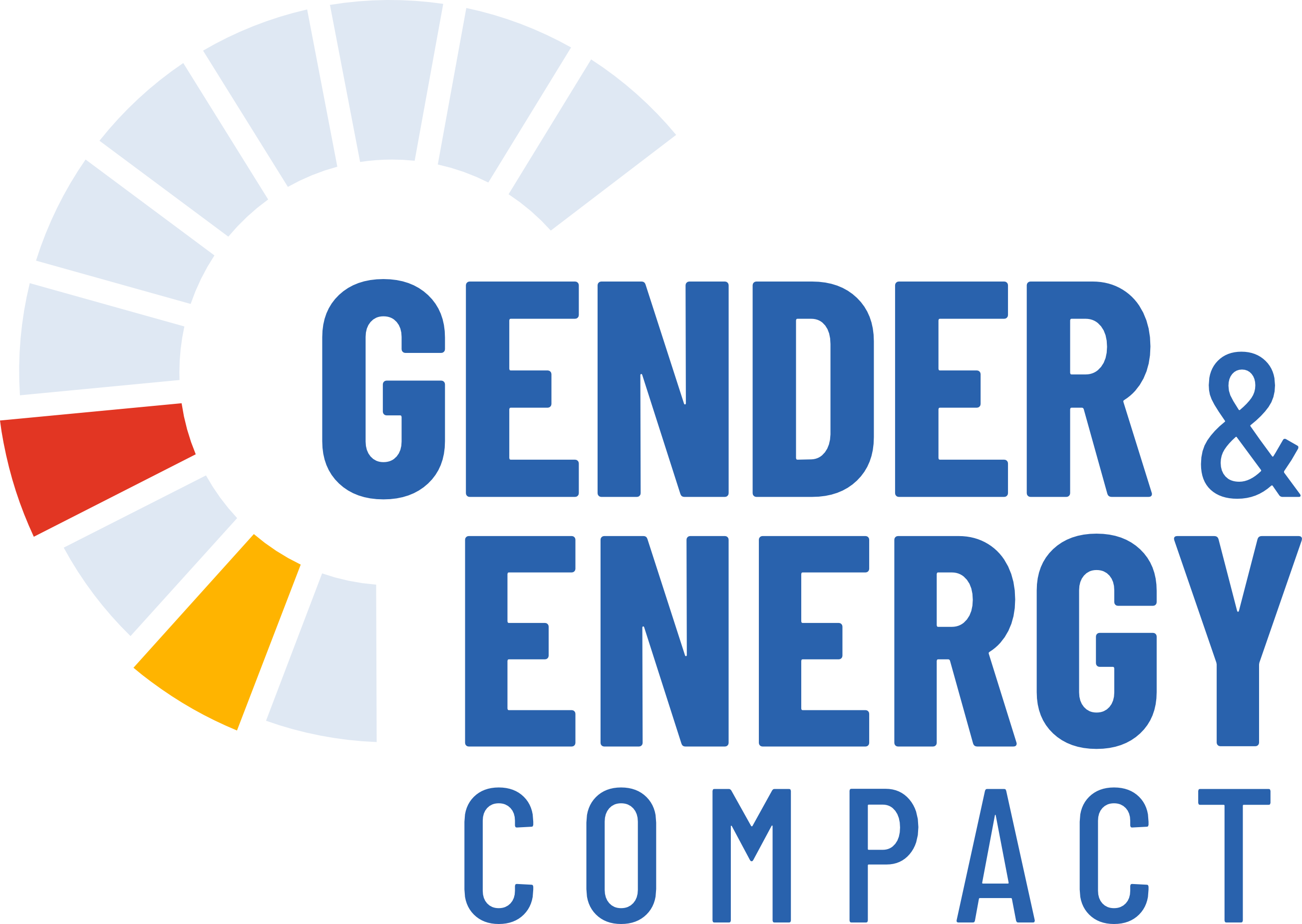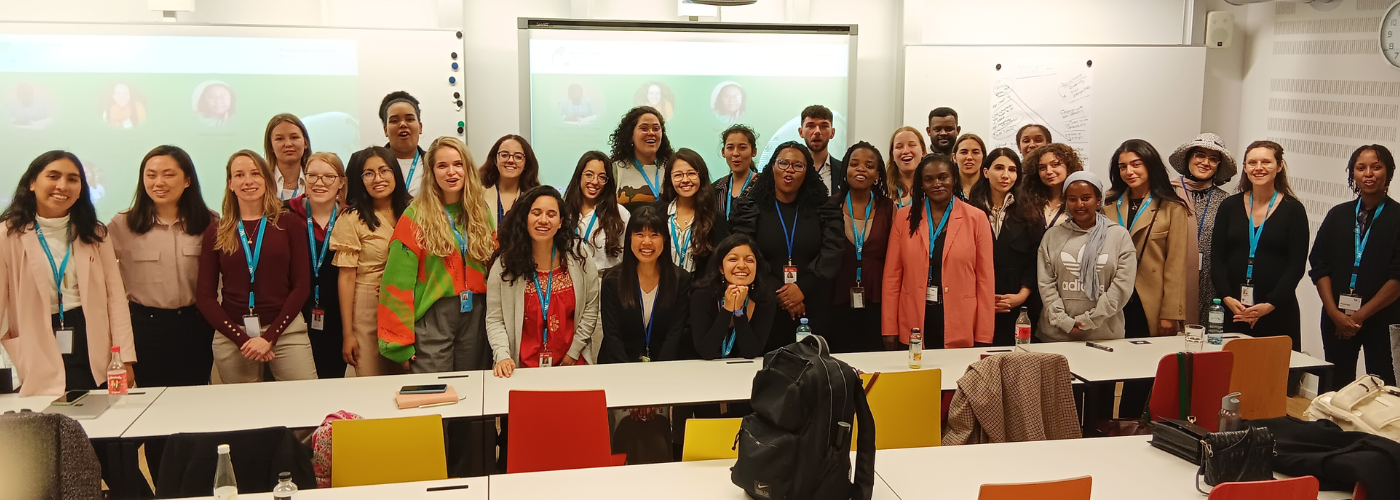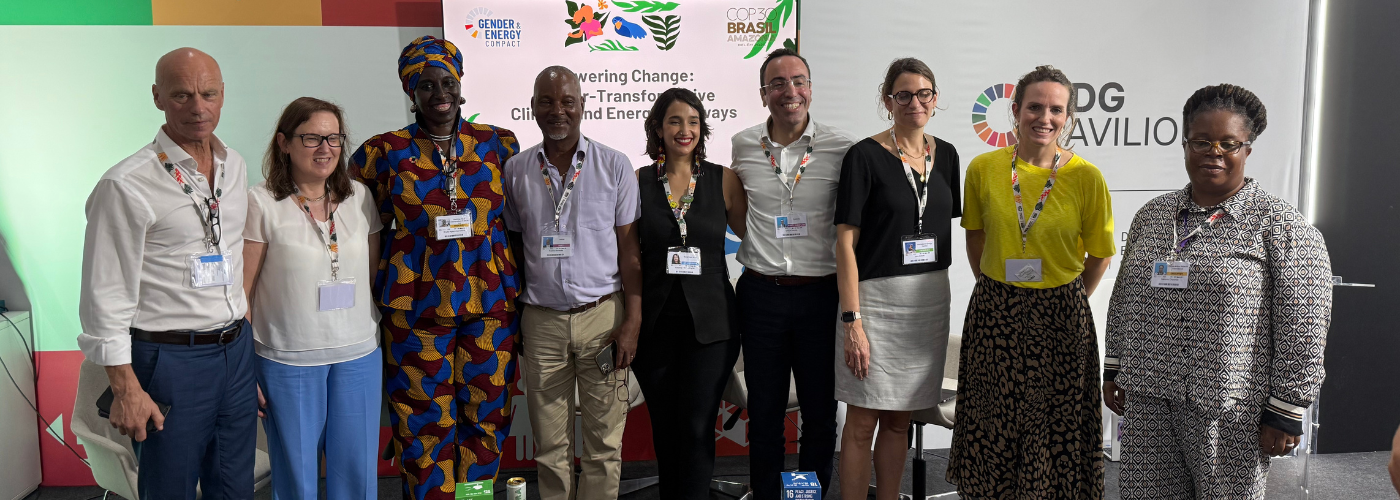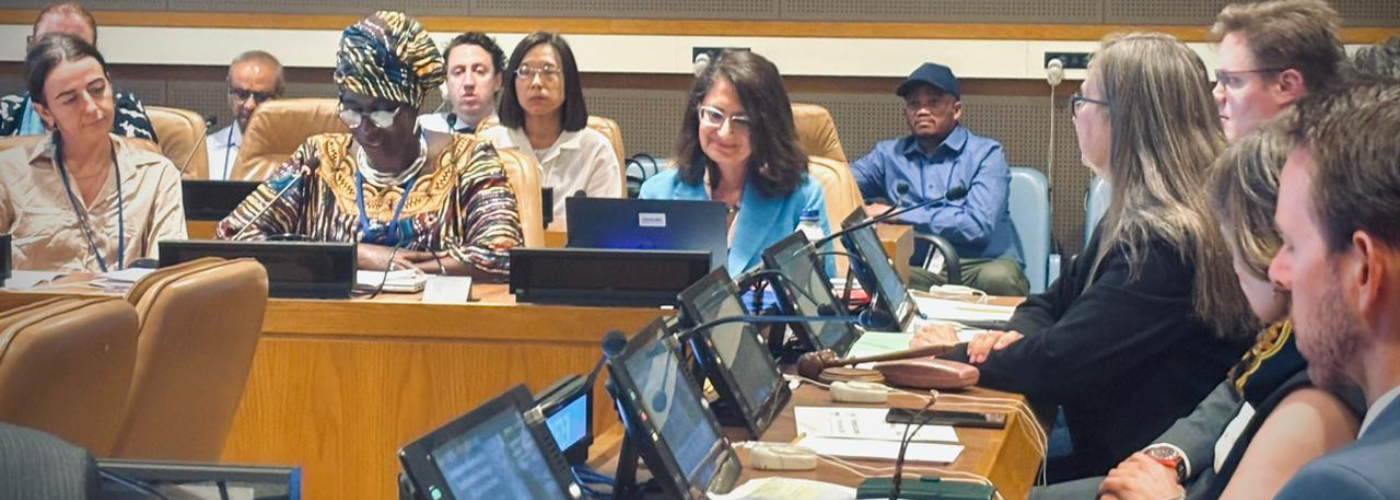From October 30 to November 3, the United Nations Industrial Development Organisation (UNIDO), the International Institute for Applied Systems Analysis (IIASA), the Austrian Development Agency (ADA) and the Austrian Federal Ministry for European and International Affairs organized the International Vienna Energy and Climate Forum (IVECF) and the Youth Solutions Days (YSD). For five days, government representatives, private sector CEOs, NGOs, practitioners and young professionals gathered to discuss and exchange best practices and innovative solutions to accelerate an inclusive energy transition and contribute to global climate action. The Gender and Energy Compact initiators ENERGIA, UNIDO and GWNET, together with SEforALL, the Clean Cooking Alliance, the LDC Group on Climate Change and other partners organized a series of gender-related side events on behalf of the Gender and Energy Compact Coalition, raising awareness on the need for gender equality and women’s empowerment and putting gender transformative action center stage.
Women changemakers leading climate action and the sustainable energy transition in LDCs and beyond
During the first session of the Gender Track, co-organized by UNIDO, GWNET and the LDC Group on Climate Change, five panelists took the audience on their journey into climate action and energy, after which they shared highlights and challenges in their careers and discussed career options within the sector. From the start, the diversity of experiences of the panelists was evident. Ms. Stella Funsani Gama started her career in the Forestry Department of the Ministry of Natural Resources of her country and entered climate-change negotiation spaces because of the deforestation-climate nexus. Ms. Natalia Weber was an energy engineer who understood the potential of renewable energy, while Ms. Paola Carvajal saw the impact of climate change in an indigenous community in Bolivia, where she lived. It turned her into the climate advocate and educator for indigenous communities she is today.
Even though all panelists successfully entered and operate in the climate and energy space, it was also apparent that barriers that limit women’s participation still remain. Sandiswa Qayi elaborated on the need to raise your voice and at the same time the difficulty of having your voice heard in male-dominated spaces, while Haruka Yoshida expressed the challenge of gender mainstreaming in a sector where most people do not understand the term or how it affects their work.
When asked about how they are opening doors for other women, the panelists shared their involvement in mentorship, coaching, internships and skills incubation for younger women. They also encouraged the audience to not only take advantage of these opportunities but ensure that they support other young women in whatever capacity they have.
Wrapping up the session, the participants had the opportunity to craft messages for critical stakeholders, urging them to involve youth and especially young women in the energy and climate sector.
Call to Action:
- To the Private Sector: It makes economic sense. If you don’t engage and hire women (including in management roles), you lose customers and ultimately invaluable skills that women have.
- To Policy Makers: Policy makers need to create an enabling environment for women at the national and global level to thrive. This includes training and skilling programs, financing opportunities for women entrepreneurs and active engagements where ideas are acknowledged and implemented.
- To the Youth: Youth is about being a changemaker. Be proactive, think outside the box, and take space. You are needed!
Gender and energy workshop
The discussions in this event, co-organized by SEforAll and UNIDO revolved around the intersectionality of climate and energy, underscoring the significant role that women play in driving sustainability in both spheres. A dual-track approach was also touched on, emphasizing the necessity of mainstreaming gender through both broad-scale gender mainstreaming and targeted actions, with the goal of achieving gender equality and empowering women.
Interactive breakout sessions provided a platform for engaging the youth in brainstorming and generating solutions to specific issues.
Leveraging Technology to Empower Women – The discussions centered on harnessing technology to empower women and reduce disparities. In the area of education, it was suggested that the creation of podcasts or radio programs in local dialects can be effective in bridging these gaps, as women can access educational content while performing daily chores.
For health, the group highlighted the potential of clean cooking technology to improve health by significantly reducing exposure to smoke, as well as the significance of waste-to-energy initiatives at both household and community levels to keep the environment clean while creating opportunities for energy generation.
Sustainable Energy Services for All – This group emphasized the importance of consulting with women to understand their needs and ensure that their participation in the development of services and solutions is free from gender bias. They advocated for engaging women from various sectors and education levels to collect diverse opinions and develop inclusive energy services.
Financing Gender-Inclusive Energy Solutions – In this session, it was proposed to educate women and girls from a young age in STEM topics, equipping them to pursue careers in the field and contribute to the innovation and development of technologies and solutions that benefit women and marginalized groups.
Promoting gender-lens investing emerged as another key point, encouraging support for gender-based businesses, women-led companies, and solutions, ensuring they receive the financial backing required for scaling up activities and contributing to increased employment among women and youth.
Finally, the need for gender-based or inclusive policies within the government and legislative bodies was emphasized.
Call to Action:
We call for decision-makers in the clean energy and climate space to:
- Embrace the youth’s vision for a gender-equitable future by integrating women’s voices in policy-making, investing in women-led clean energy solutions, providing young women with increased access to paid traineeships and job opportunities, supporting energy solutions that reduce gender inequalities and empowering women through education in STEM.
- Prioritize the development of technologies and infrastructures that address women’s specific needs and enact gender-inclusive policies that ensure women’s equal participation in driving sustainable and resilient energy systems.
- Act now for a fair, inclusive, just and balanced energy future!.
Staying sane while saving the planet: Navigating emotional challenges and preventing activist burn-out for sustainable and resilient climate action through participatory learning spaces and embodied practices
Young people are leading the climate action agenda globally. They are at the frontlines of Climate Justice Movements and engage as activists, entrepreneurs, and community leaders. At the same time they are also at great risk of suffering the consequences of inaction in the years ahead, especially youth from Least Developed Countries (LDCs) are among those that will bear the brunt of climate impacts. That is why it is crucial for youths from LDCs to have a say at the climate negotiations and discussion tables and provide solutions from their own perspective. Nevertheless, young climate activists in LDCs are facing heightened stressors and emotional challenges due to their frontline roles in climate impacted zones. As a consequence young people in LDCs and beyond can encounter several unique complexities when navigating the global climate space.
The workshop co-oganized by UNIDO and the LDC Group on Climate Change “Staying sane while saving the planet: Navigating emotional challenges and preventing activist burn-out for sustainable and resilient climate action through participatory learning spaces and embodied practices” dedicated to empowering young climate activists addressed critical aspects of sustainable and resilient climate action. Facilitated by UNIDO’s Gender and Youth Empowerment Advisor, Katharina Pröstler, and moderated by Yared Abera and Isabella Pfoser, the session provided a transformative and insightful experience to the young participants from all over the world.
Brenda Mwale, Prakriti Koirala, and Yared Abera, all three youth representatives of the LDC Group on Climate Change, delivered thought-provoking insights into the vulnerabilities of youth, from LDCs, and set the stage for a deep dive into emotional challenges and systemic inequalities.
Joy Reyes, a Climate Justice Lawyer from Friends of the Earth Philippines, added invaluable perspectives. She shared her belief that self-care is a form of resistance, emphasizing its role in creating a more sustainable world. Joy’s reflections on the importance of slowing down and allowing the earth to carry one’s weight resonated strongly, offering a grounding perspective amidst constant activism.
After the keynote introductions, the workshop engaged participants in identifying the main challenges faced by youth in combating climate change. Through group discussions and practical exercises, participants explored the emotional aspects of their activism and learned coping mechanisms. A session on navigating emotional challenges and preventing burnout led by Isabella Pfoser, UNFCCC Youth Delegate, Facilitator of Yoga and Activism Integration and Trainer for Inner Resilience in Climate Initiatives, added a practical dimension to the workshop.
The workshop’s culmination involved participants crafting the following key messages for decision-makers, addressing systemic challenges and advocating for inclusive spaces.
- For Policy Makers: Take the opportunity to be heard through creating platforms and taking action, especially in decision making. This urged policymakers to actively engage and create inclusive decision-making processes for impactful climate policies.
- For Youth: We need to do something. We need to take action. A resounding call to action emphasized the urgency for proactive engagement and tangible initiatives by young climate activists.
- For Policy Makers: Can you hear us, trust us, involve us, so we can make a change together? This heartfelt plea aimed to foster collaboration, recognizing the importance of trust and involvement in bringing about meaningful and sustainable change.
- For Youth: Connect, speak up, and act! Empowering the youth to be proactive agents of change, this message urged them to connect, vocalize concerns, and take concrete actions for climate justice.
Catalyzing sustainable development goals through clean cooking solutions Part II – Catalyzing women and youth empowerment through clean cooking
This session recognized that the African energy sector is experiencing a transformative shift with a growing recognition of the essential role women play in driving sustainable energy solutions, innovation, and economic development. Despite the traditional focus on women as victims and beneficiaries of clean cooking, African women have increasingly been breaking barriers, making significant contributions, and leading positive change in various aspects of the sector. The roles for women in the African clean cooking energy sector are as diverse as they are impactful. Three areas where women are having impact are entrepreneurship, community engagement and leadership and innovation
Entrepreneurship: African women are increasingly becoming entrepreneurs in the clean cooking sector, establishing and leading their own businesses. Their entrepreneurial endeavors not only contribute to economic growth but also provide solutions to energy access challenges in underserved areas.
Community engagement: Women play a crucial role in engaging and empowering local communities to embrace clean energy solutions, promoting awareness, education, and local participation in energy access projects. This community-focused approach ensures the successful implementation of clean energy initiatives while supporting grassroots development.
Leadership and innovation: African women are taking on leadership positions in clean cooking companies, government agencies, and organizations, driving innovation and advancing clean energy solutions. Their expertise is instrumental in shaping a more sustainable and inclusive energy future.
Solutions by women Changemakers
The high-level plenary on Solutions by Women Changemakers, organized by UNIDO highlighted the leading role of women as innovators and entrepreneurs in developing and deploying innovative, clean energy solutions that are needed for a sustainable and inclusive energy transition. The session resulted in three key messages:
- There is a growing recognition of the pivotal role that women play within the energy workforce. Women are not merely vulnerable groups in the energy sector; they are key agents of change. They are consumers, producers, distributors, and decision-makers across the energy value chain.
There is a need to empower and support women in the energy sector by recognizing their power as catalysts for innovation and development. - Gender-diverse boardrooms are essential for improved company performance, innovation, and development in the energy sector. Companies with greater gender diversity in leadership achieve better outcomes.
Therefore, there is a need to promote gender diversity in leadership and boards across the energy sub sectors as a means to drive positive change and enhance overall sector performance. - Despite the recognition of women’s potential in the energy sector, the gender gap remains significant, particularly in renewable energy. Women and girls face numerous challenges, including limited access to finance, insecure land titles, and time poverty due to imbalanced care work distribution.
Therefore, there is an urgency of addressing barriers that hinder women to equally participate, contribute, and benefit from the energy transition.
Energizing Equality: Harnessing womens’ power and skills for climate action and sustainable energy
This session focused on women’s participation in the energy and climate workforce. After the welcome and opening speeches, two keynote speakers both presented new research. Ms. Stella Funsani Gama, Gender Coordinator at the LDC Group on Climate Change, and Director of Forestry at the Ministry of Natural Resources and Climate Change in Malawi, gave a sneak peek of a research on women’s participation in climate delegation and negotiations, or rather the lack thereof. It looks into the reason why the number of participating women is so limited and identifies entry points and ways to increase women’s participation. Ms. Christine Lins, Executive Director of the Global Women’s Network for the Energy Transition (GWNET) presented Europe’s Energy Transition: Women’s Power in Solving the Labour Bottleneck, a new study by GWNET that presents concrete recommendations for policy makers, for unions and employer’s organizations, to companies and the education sector.
After these presentations, five panelists took the floor, all contributing to the discussion drawing on their own experience and expertise. Ms. Brynhildur Sörensen of the Ministry of Foreign Affairs noted that since gender is at the heart of development policy and other realms, remarkable changes happened. “When women made up 40 – 50% of management in Reykjavik Energy, profits went up. This is a no-brainer: we need to include women!” she said, while Mr. Jean François Gagné from the Clean Energy Ministerial talked about the importance of data and the need to raise awareness about the current statistics, which clearly show the imbalanced situation. “Gender inclusion is NOT a women’s thing”, he affirms. “It’s a SOCIETAL thing. It concerns us all!” Other panelists talked about the different programs, tools and mentorships their organization has developed to contribute to closing the gender gap, the need to be context specific and to promote female leadership, e.g. through mentorship, flexible working and recruitment. “Every year we see an increase in jobs in renewable energy” Ute Colier from IRENA claims. “But we do not see an increase reflected in the percentage of women holding these jobs”. Overall, speakers concluded calling for an increased involvement of and support for women and girls. It’s loud and clear that we need to harness womens’ power and skills to make climate action and the energy transition just and inclusive.
Fireside chats: Catalyzing action for gender equality and women’s empowerment
This event was jointly organized by the Gender and Energy Compact coordinating organizations ENERGIA, UNIDO, GWNET and SEforALL. The moderator Irene Giner Reichl invited the approximately fifty participants to join an engaging discussion on how to catalyze action towards gender equality and women’s empowerment to accelerate a just, inclusive and sustainable energy transition. The fireside chat featured three short compelling interventions and actively involved the audience.
Ms. Stella Gama, Director of Forestry, Ministry of Natural Resources and Climate Change, Malawi announced that Malawi aims to join the Gender Energy Compact.
Ms. Helen Watts, Executive Director of Student Energy and Asma Rouabhia, Young Leader and Global Focal Point SDG7 Youth Constituency talked about the challenges that young women face in the energy sector and how these could be addressed. They also outlined that the Gender and Energy compact could be a great tool to assist in addressing the challenges young women face.
Mr. Martin Lugmayr, Project Manager at UNIDO, stated that ‘We are at a critical juncture, but it is not too late to take action,’ inviting all stakeholders to join the Gender and Energy Compact in the collective effort to ensure that women and girls can equally lead, participate in and benefit from sustainable energy.










